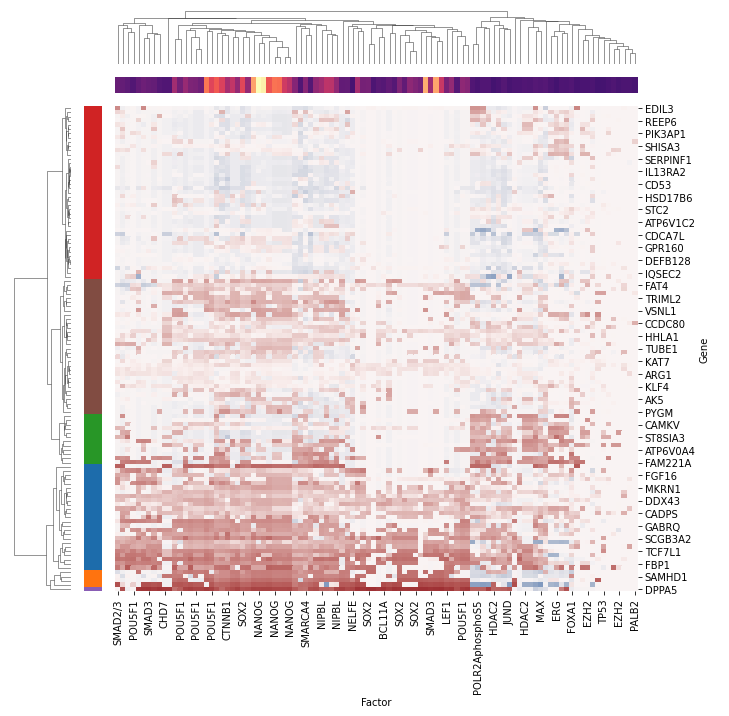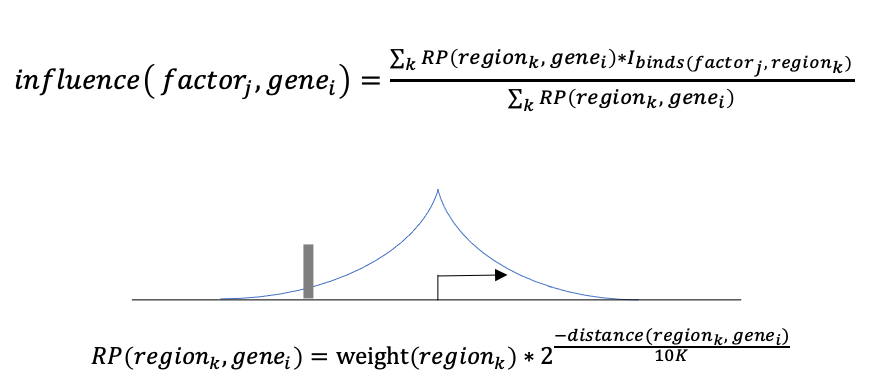Table of Contents
LISA is a statistical test for the influence of Transcription Factors on a set of genes. We leverage integrative modeling of public chromatin accessiblity and factor binding to make predictions that go beyond simple co-expression analysis. The minimum you need to run LISA is a list of genes-of-interest, but you can also supply your own epigenetic background. For more information, see Qin et al., 2020. This implementation extends the original, running faster, reducing dependencies, and adding useful CLI functions for pipeline integration.
The python package is easy to install and has a rich set of features and options. For a quick introduction to the method, check out the web interface.
- The key components of the LISA test are the:
- profile, a distribution of accessibility over regions in the genome, supplied by user or predicted from public data
- hits, the regions where a TF is predicted to bind (through ChIP-seq or motif)
- region-gene map, maps the influence of a region to nearby genes.
First, LISA constructs a null model of gene influence, which assumes each accessible region is occupied by its associated factors, and that all factor-bound regions exert influence on nearby genes. LISA then tests for the influence of a factor on a gene by calculating what proportion of that gene's influence could be attributed to that factor binding nearby regions. When you provide genes-of-interest, LISA finds factors that preferentially affects these genes over a sampling of background genes.
Refer to the User Guide to see it in action. Refer to the Data Analysis Guide to see the questions LISA can help you answer.
- Mac or Linux OS
- Python 3.6+
- 15 GB of available storage space
LISA will install data into the virutal environment's "site_packages" directory, so ensure the env's location can store ~10GB.
It is recommended to install lisa to a virtual environment:
$ python3 -m venv .venvs/lisa_env
$ source .venvs/lisa_env/bin/activateInstall LISA to this virtual env using this command:
(lisa_env) $ pip install lisa2First, create a virtual environment:
(base) $ conda create --name lisa_env
(base) $ conda activate lisa_envThen install from Conda:
(lisa_env) $ conda install -c liulab-dfci lisa2If you successfully install lisa but the program fails while downloading data, follow these manual dataset installation instructions.
LISA's cli offers convenient methods for the most common use cases. See the API, or try:
(lisa_env) $ lisa {command} --help
for parameter descriptions. See the User Guide for best practices.
The python module allows more control over the LISA test and more convenient data analysis. See the Python API and the User Guide.
[2.3.0] - 2022-03-15
Removed coverage test from base LISA install because pyBigWig was causing problems with installation. Now, to install the coverage test, do
$ pip install lisa2[coverage]- Loosening H5py requirements for easier install.
[2.2.4] - 2021-03-01
- Added "lisa deseq" interface for parsing DESeq2 output files for fast LISA tests of DE genes
[2.2.0] - 2021-01-10
- Added "FromRegions" test, and moved all older functionalities to "FromGenes". New feature allows user to run LISA test with their own regions-of-interest
- Added "query_reg_score" and "background_reg_score" matrices to output metadata of "FromRegions" test, which allows user to see which genes are likely regulated by each factor.
- New backend interface for faster file transfers
- Added ability to append more data to backend for future updates, including ATAC-seq epigenetic backgrounds
- Added more documentation and user guide
- Appended new ATAC data and reprocessed motifs using JASPAR database
- Removed "cores" option from multi and oneshot tests, and removed mutliprocessing from package.
- Removed "one-vs-rest" test because proved to provide unstable results
[2.1.0] - 2020-12-01
- Bugfixes in output of "lisa multi" test
- Refactored classes for future extension to user-supplied fragment files and peaks
- Added integration testing
- Added factor accessibility introspection to results printout
- Made RP maps substitutable for future tests
- Made assays modular so users can specify which statistical tests they are interested in
[2.0.6] - 2020-11-22
- Support for Lisa version 1 API for integration with LISA website
- Bugfixes in motif mode results
- Slight speedups in parallelization of insilico-delition computing
If you have questions, requests, or issues, please email alynch@ds.dfci.harvard.edu.

